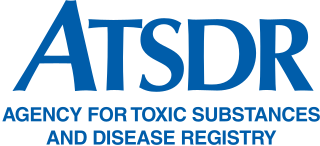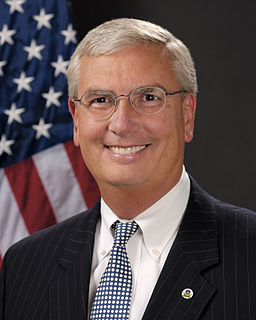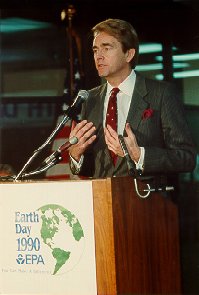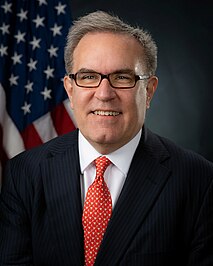Related Research Articles

The Environmental Protection Agency (EPA) is an independent agency of the United States federal government for environmental protection. President Richard Nixon proposed the establishment of EPA on July 9, 1970 and it began operation on December 2, 1970, after Nixon signed an executive order. The order establishing the EPA was ratified by committee hearings in the House and Senate. The agency is led by its Administrator, who is appointed by the President and approved by Congress. The current Administrator is former Deputy Administrator Andrew R. Wheeler, who had been acting administrator since July 2018. The EPA is not a Cabinet department, but the Administrator is normally given cabinet rank.

The Agency for Toxic Substances and Disease Registry (ATSDR) is a federal public health agency within the United States Department of Health and Human Services. The agency focuses on minimizing human health risks associated with exposure to hazardous substances. It works closely with other federal, state, and local agencies; tribal governments; local communities; and healthcare providers. Its mission is to "Serve the public through responsive public health actions to promote healthy and safe environments and prevent harmful exposures." ATSDR was created as an advisory, nonregulatory agency by the Superfund legislation and was formally organized in 1985.

The United States federal Superfund law is officially known as the Comprehensive Environmental Response, Compensation, and Liability Act of 1980 (CERCLA). The federal Superfund program, administered by the U.S. Environmental Protection Agency (EPA) is designed to investigate and clean up sites contaminated with hazardous substances. Sites managed under this program are referred to as "Superfund" sites. There are 40,000 federal Superfund sites across the country, and approximately 1,600 of those sites have been listed on the National Priorities List (NPL). Sites on the NPL are considered the most highly contaminated and undergo longer-term remedial investigation and remedial action (cleanups).

Carol Martha Browner is an American lawyer, environmentalist, and businesswoman, who served as director of the White House Office of Energy and Climate Change Policy in the Obama administration from 2009 to 2011. Browner previously served as Administrator of the Environmental Protection Agency (EPA) during the Clinton administration from 1993 to 2001. She currently works as a Senior Counselor at Albright Stonebridge Group, a global business strategy firm.

Stephen Lee Johnson was the Administrator of the Environmental Protection Agency (EPA) under President George W. Bush during the second term of his administration. He has received the Presidential Rank Award, the highest award that can be given to a civilian federal employee.

William Kane Reilly was Administrator of the Environmental Protection Agency under President George H. W. Bush. He has served as president of World Wildlife Fund, as a founder or advisor to several business ventures, and on many boards of directors. In 2010, he was appointed by President Barack Obama co-chair of the National Commission on the BP Deepwater Horizon Oil Spill and Offshore Drilling to investigate the oil spill in the Gulf of Mexico.

Lisa Perez Jackson is an American chemical engineer who served as the Administrator of the United States Environmental Protection Agency (EPA) from 2009 to 2013. She is the first African-American to have held that position.

Marine Protection, Research and Sanctuaries Act of 1972 (MPRSA) or Ocean Dumping Act is one of several key environmental laws passed by the US Congress in 1972. The Act has two essential aims: to regulate intentional ocean disposal of materials, and to authorize any related research. While the MPRSA regulates the ocean dumping of waste and provides for a research program on ocean dumping, it also provides for the designation and regulation of marine sanctuaries. The act regulates the ocean dumping of all material beyond the territorial limit and prevents or strictly limits dumping material that "would adversely affect human health, welfare, or amenities, or the marine environment, ecological systems, or economic potentialities". The MPRSA authorized the Environmental Protection Agency (EPA) to regulate ocean dumping of materials including, but not limited to, industrial waste, sewage sludge, biological agents, radioactive agents, NBC, garbage, chemicals, and biological and laboratory, as well as other wastes, into the territorial waters of the United States through a permit program. The EPA can issue permits for dumping of materials other than dredge spoils if the agency determines, through a full public notice and process, that the discharge will not unreasonably degrade or endanger human health or welfare or the marine environment. The law also has provisions related to creating marine sanctuaries, conducting ocean disposal research and monitoring coastal water quality.
Massachusetts v. Environmental Protection Agency, 549 U.S. 497 (2007), is a 5-4 U.S. Supreme Court case in which twelve states and several cities of the United States brought suit against the Environmental Protection Agency (EPA) to force that federal agency to regulate carbon dioxide and other greenhouse gases (GHGs) as pollutants.

Edward Scott Pruitt is an American lawyer, lobbyist and Republican politician from the state of Oklahoma. He served as the fourteenth Administrator of the Environmental Protection Agency (EPA) from February 17, 2017, to July 6, 2018. He was nominated for the EPA position by President Donald Trump and was confirmed by the United States Senate to lead the EPA in a 52–46 vote.

Reorganization Plan No. 3 was a presidential directive submitted to the United States Congress on July 9, 1970 by President Richard Nixon establishing the Environmental Protection Agency (EPA) and setting forth the components of the National Oceanic and Atmospheric Administration (NOAA). The order consolidated components from different Federal agencies to form the EPA, "a strong, independent agency" that would establish and enforce federal environmental protection laws. Unlike other agencies such as OSHA, the EPA was not established by a single enabling act of Congress.

The Food Quality Protection Act (FQPA), or H.R.1627, was passed unanimously by Congress in 1996 and was signed into law by President Bill Clinton on August 3, 1996. The FQPA standardized the way the Environmental Protection Agency (EPA) would manage the use of pesticides and amended the Federal Insecticide, Fungicide, and Rodenticide Act and the Federal Food Drug and Cosmetic Act. It mandated a health-based standard for pesticides used in foods, provided special protections for babies and infants, streamlined the approval of safe pesticides, established incentives for the creation of safer pesticides, and required that pesticide registrations remain current.
The environmental policy of the United States is a federal governmental action to regulate activities that have an environmental impact in the United States. The goal of environmental policy is to protect the environment for future generations while interfering as little as possible with the efficiency of commerce or the liberty of the people and to limit inequity in who is burdened with environmental costs. As his first official act bringing in the 1970s, President Richard Nixon signed the U.S. National Environmental Policy Act (NEPA) into law on New Years Day, 1970. Also in the same year, America began celebrating Earth Day, which has been called "the big bang of U.S. environmental politics, launching the country on a sweeping social learning curve about ecological management never before experienced or attempted in any other nation." NEPA established a comprehensive US national environmental policy and created the requirement to prepare an environmental impact statement for “major federal actions significantly affecting the quality of the environment.” Author and consultant Charles H. Eccleston has called NEPA, the world's “environmental Magna Carta”.

The Clean Air Act of 1963 is a United States federal law designed to control air pollution on a national level. It is one of the United States' first and most influential modern environmental laws, and one of the most comprehensive air quality laws in the world. As with many other major U.S. federal environmental statutes, it is administered by the U.S. Environmental Protection Agency (EPA), in coordination with state, local, and tribal governments. Its implementing regulations are codified at 40 C.F.R. Sub-chapter C, Parts 50-97.
Traditional Ecological Knowledge (TEK) describes indigenous and other forms of traditional knowledge regarding the sustainability of local resources. As a field of study in anthropology, TEK refers to "a cumulative body of knowledge, belief, and practice, evolving by accumulation of TEK and handed down through generations through traditional songs, stories and beliefs. It is concerned with the relationship of living beings with their traditional groups and with their environment." Such knowledge is commonly used in natural resource management as a substitute for baseline environmental data to measure changes over time in remote regions that have little recorded scientific data.

The United States Environmental Protection Agency (EPA) was established in July 1970 when the White House and the United States Congress came together due to the public's demand for cleaner natural resources. The purpose of the EPA is to repair the damage done to the environment and to set up new criteria to allow Americans to make a clean environment a reality. The ultimate goal of the EPA is to protect human health and the environment.
The United States Environmental Protection Agency (EPA) began regulating greenhouse gases (GHGs) under the Clean Air Act from mobile and stationary sources of air pollution for the first time on January 2, 2011. Standards for mobile sources have been established pursuant to Section 202 of the CAA, and GHGs from stationary sources are currently controlled under the authority of Part C of Title I of the Act. The basis for regulations was upheld in the United States Court of Appeals for the District of Columbia in June 2012.

Regina McCarthy is an American environmental health and air quality expert who served as the 13th Administrator of the Environmental Protection Agency (EPA) from 2013 to 2017.

Andrew R. Wheeler is an American attorney and serves as the 15th Administrator of the United States Environmental Protection Agency (EPA). He served as the deputy administrator from April to July 2018, and served as the acting administrator from July 2018 to February 2019. He previously worked in the law firm Faegre Baker Daniels, representing coal magnate Robert E. Murray and lobbying against the Obama Administration's environmental regulations. Wheeler served as chief counsel to the United States Senate Committee on Environment and Public Works and to the chairman U.S. Senator James Inhofe, prominent for his rejection of climate change. Wheeler is a critic of limits on greenhouse gas emissions and the Intergovernmental Panel on Climate Change.

Michael L. Dourson is an American toxicologist and Director of Science at the nonprofit organization, Toxicology Excellence for Risk Assessment. He was formerly a senior advisor to the Administrator of EPA, and prior to that, a professor at the Risk Science Center at the University of Cincinnati College of Medicine. Prior to joining the University of Cincinnati, he was founder and president of the nonprofit Toxicology Excellence for Risk Assessment. Earlier in his career, he was employed by the Environmental Protection Agency Environmental Criteria and Assessment Office, among other assignments.
References
- ↑ Former Deputy Administrator Hank Habicht talks about management at EPA. An Interview with Hank Habicht Video, Transcript (see p8). December 21, 2012.
